Birmingham pub bombings: What do we know?
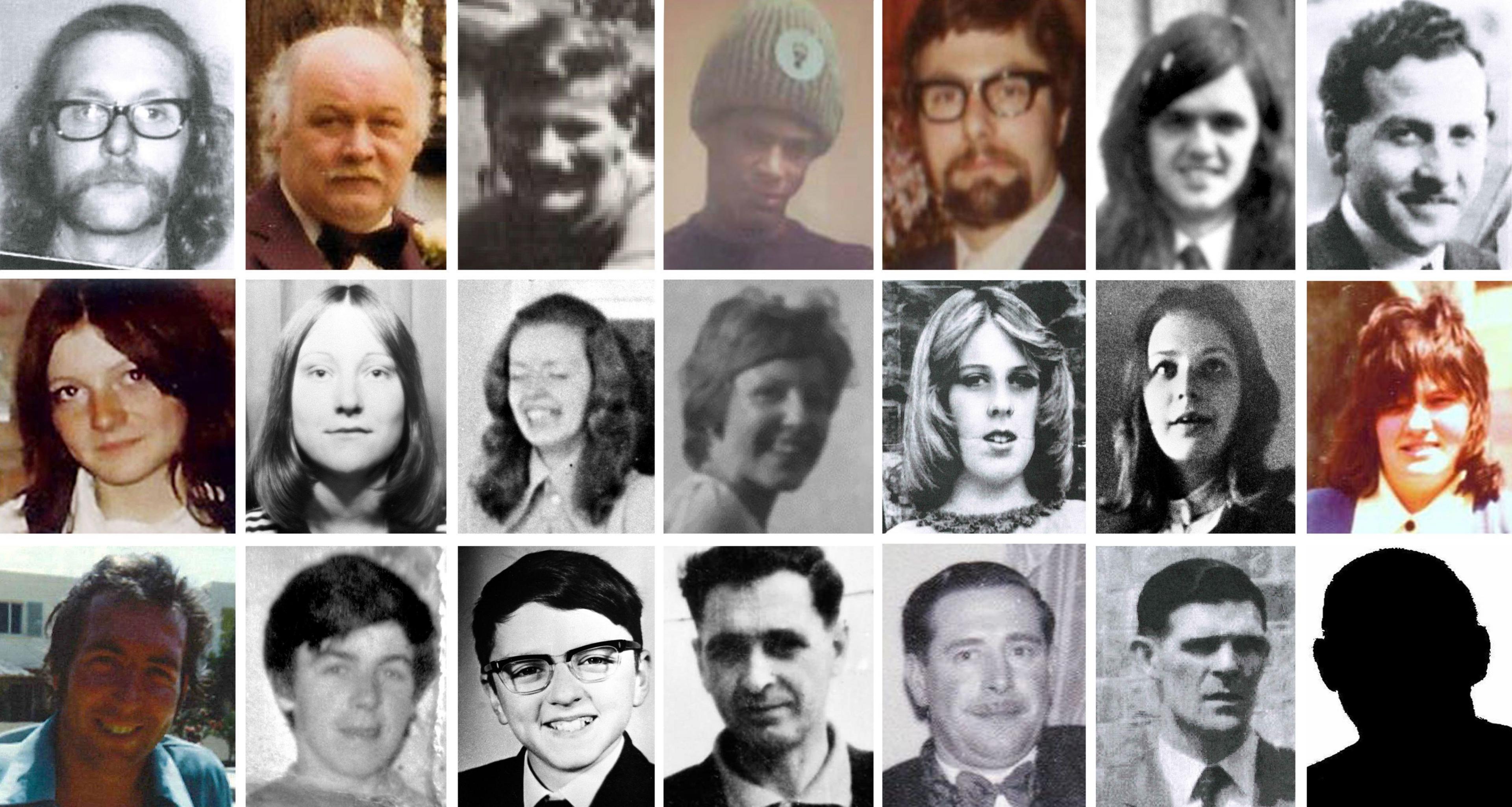
Seven women and 14 men, including seven teenagers, died after the IRA planted bombs at two Birmingham pubs on 21 November 1974
- Published
The Birmingham pub bombings is the biggest unsolved mass murder in British history - it saw 21 people killed after IRA bombs were detonated in two city-centre pubs 51 years ago.
Six innocent men served more than 16 years in prison, before their convictions were quashed, but the real perpetrators have not yet been brought to justice.
On 30 October 2025, the government announced it would not launch a public inquiry into the bombings.
More than five decades on from the deaths, what do we know about that day, and the events that followed?
What happened in the Birmingham pub bombings?
At 20:11 GMT on 21 November 1974, a telephonist at the Birmingham Mail and Post received a call from a man who said two bombs had been planted in the city centre.
Seven minutes later the first device detonated at The Mulberry Bush, a pub at the foot of the city's iconic Rotunda building.
Then, at 20:20, a second explosion destroyed The Tavern in the Town, an underground bar directly below the tax office.
In total 21 people died and 220 were injured.
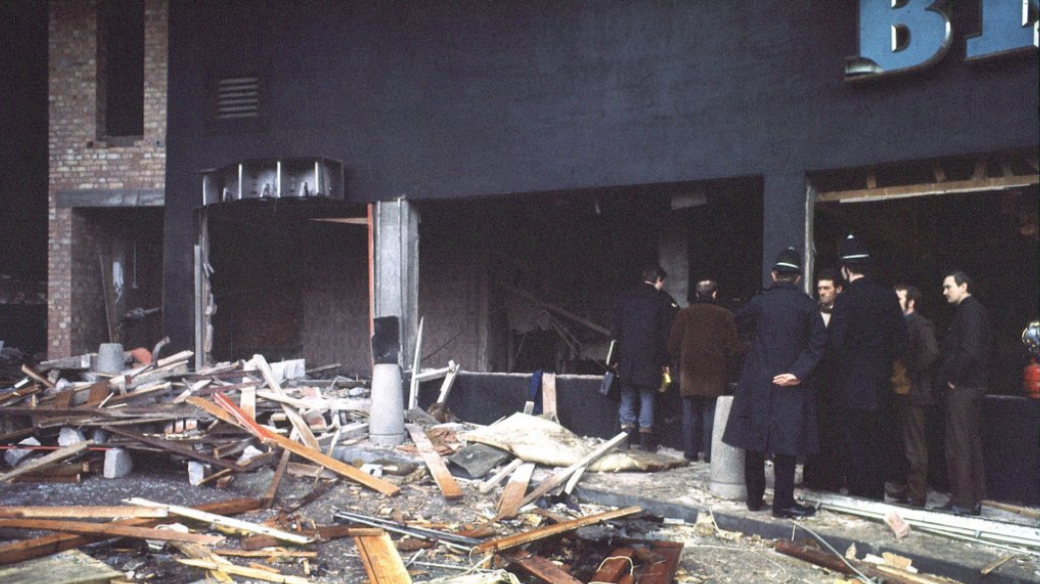
Up to 50 people were in the Mulberry Bush pub on New Street, Birmingham when a bomb exploded at 20:17 on 21 November 1974
Who were the Birmingham Six?
Later that evening, five Irish men were stopped by police in Heysham, Morecambe, on their way to catch a ferry to Belfast.
Paddy Hill, Johnny Walker, Richard McIlkenny, Gerry Hunter and Billy Power had left Birmingham by train.
They planned to see relatives and attend the funeral of James McDade, an IRA member who had died while planting a bomb in Coventry the previous week.
The men were taken to Morecambe police station for forensic tests, and police from Birmingham were soon on their way up the M6.
At the station, forensic tests appeared to show Mr Power and Mr Hill had handled explosives.
A sixth man, Hugh Callaghan, was arrested in Birmingham the following day.
After Birmingham officers took charge, Mr Callaghan, Mr Power, Mr McIlkenny, and Mr Walker said they were coerced through physical and psychological abuse into signing confessions.
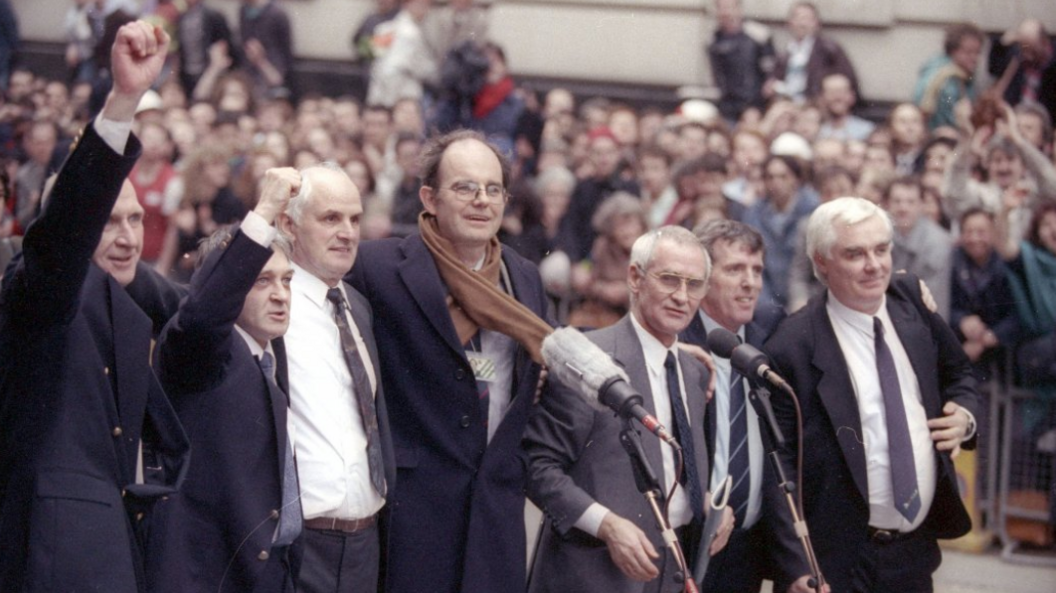
The Birmingham Six, pictured with Chris Mullin on 14 March 1991 as they walked free from court: (L-R) John Walker, Paddy Hill, Hugh Callaghan, Mr Mullin, Richard McIlkenny, Gerry Hunter and Billy Power
How were the Birmingham Six proven innocent?
The men went on trial in 1975 and protested their innocence.
The court rejected their pleas and they were each handed life sentences.
A first appeal the following year was unsuccessful. In addition, a separate trial cleared 14 prison guards of their beating at Winson Green.
In 1980, the Six attempted to bring a civil claim against police.
In dismissing it, Lord Denning said to accept officers had lied and beaten them would have created such "an appalling vista", external it was right the action should not go further.
Over time, the evidence was discredited by investigative journalist Chris Mullin, external, who became a Labour MP in 1987.
His programmes for ITV's World in Action cast doubt on the forensic and confessional evidence and also featured an interview with an unnamed alleged bomber.
Mr Mullin also published a book that argued the wrong men had been jailed.
Despite the growing evidence, the Six's second appeal in 1987 also failed, but at a third the verdicts were finally quashed and the Birmingham Six walked free on March 14 1991, after more than 16 years in jail.
The miscarriage of justice contributed to the later establishment of the Criminal Cases Review Commission, external.
The men were later awarded government compensation.
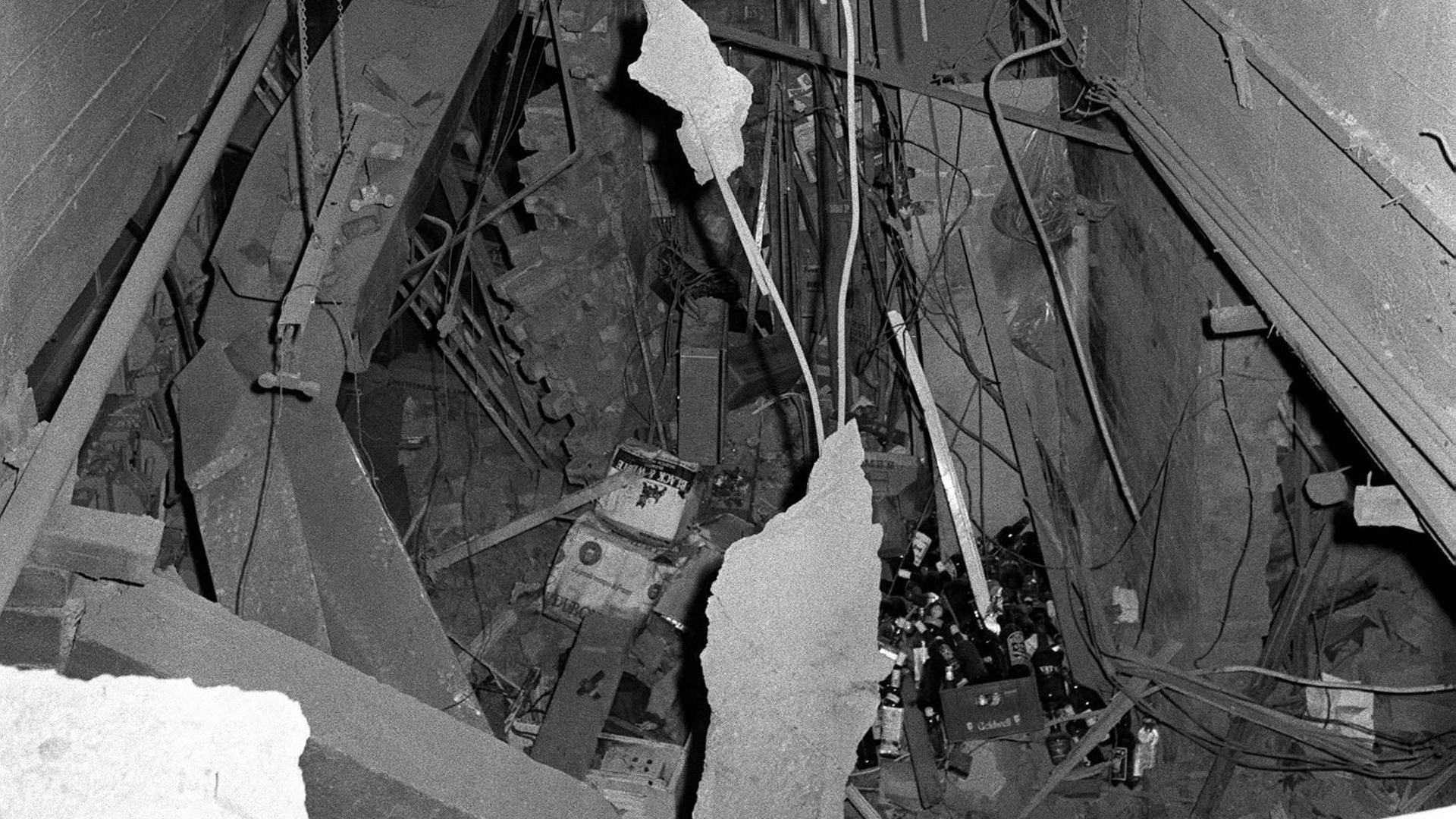
A second bomb was left by the stairs of the Tavern in the Town, a bar underneath Birmingham's tax office
Who were the real Birmingham pub bombers?
The IRA had denied the six detained men were members, but never formally admitted responsibility.
In the 1980s, Mr Mullin said he had tracked down the real bombers, but did not reveal the names until 2019 when he identified Mick Murray, James Francis Gavin and Michael Hayes.
He withheld a fourth name, which he has still not disclosed.
After campaigning from relatives, an inquest into the victims' deaths reopened in 2019.
During proceedings, a person known as Witness O said Seamus McLoughlin, Mr Hayes, Mr Gavin and Mr Murray were involved.
Of those four, only Mr Hayes is still alive.
In a 2017 interview he would not comment on his role but said he took "collective responsibility" for the IRA's actions in England and apologised for the Birmingham deaths.
A fifth man, Michael Patrick Reilly, was named in 2018 by ITV's John Ware, external as one of two alleged bomb planters.
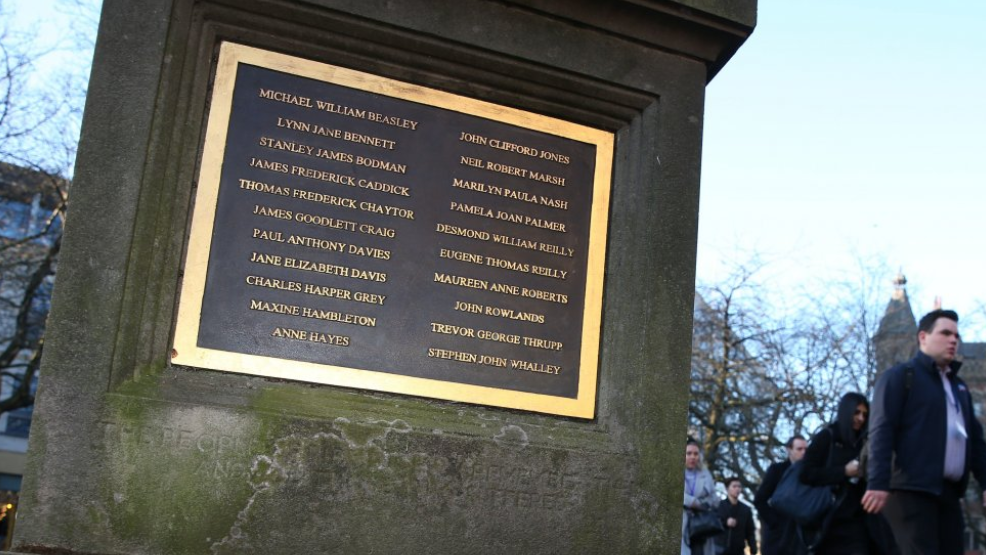
A memorial to the 21 victims of the pub bombings lies in the grounds of Birmingham's Cathedral
Who were the Birmingham pub bombing victims?
Seven women and 14 men aged between 16 and 56 died in the blasts.
Their names are Michael Beasley, John Rowlands, Stanley Bodman, John Clifford Jones, James Caddick, Neil Marsh, Paul Davies, Maxine Hambleton, Jane Davis, Stephen Whalley, Lynn Bennett, Desmond Reilly, Eugene Reilly, Marilyn Nash, Anne Hayes, Charles Gray, Thomas Chaytor, Pamela Palmer, Maureen Roberts, Trevor Thrupp and James Craig.
The inquest ruled they were murdered by IRA-planted bombs and the inadequate warning call led to their deaths.
Jurors also concluded police actions had not contributed to the loss of life.
No inquiry into 1974 IRA Birmingham pub bombings
- Published30 October
'Men responsible' for pub blasts named
- Published22 March 2019
Who were Birmingham pub bombings victims?
- Published5 April 2019
IRA call contributed to pub bomb deaths
- Published5 April 2019
Journalist allowed to keep 'pub bomber' anonymous
- Published22 March 2022
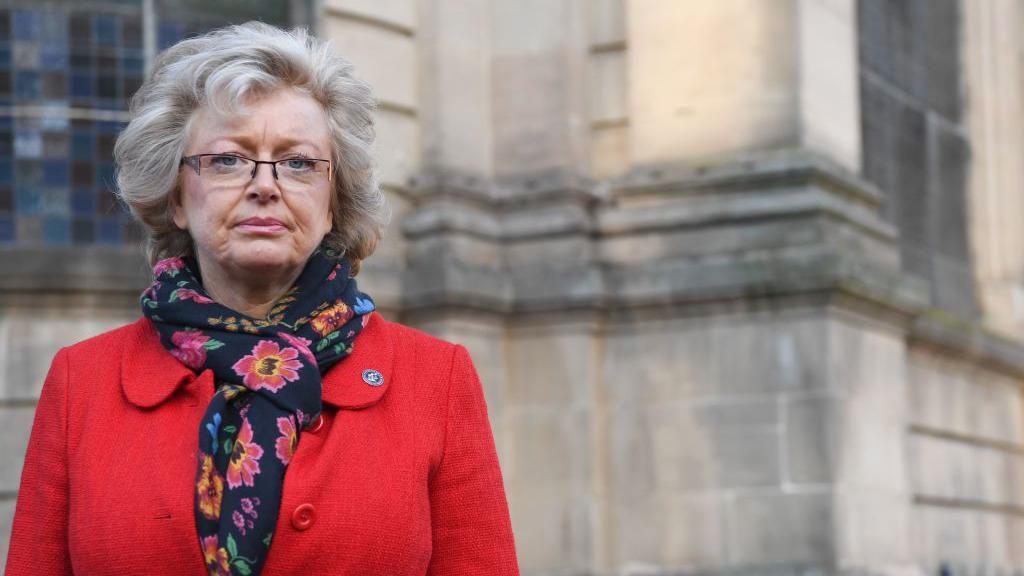
Julie Hambleton has been calling for an inquiry into the bombings
Are police still investigating the Birmingham pub bombings?
In 1994, a West Midlands Police (WMP) reinvestigation found insufficient evidence for further prosecution.
In 2020, the force arrested a 65-year-old man reported to be Mr Reilly, but he was released without charge.
Two years later, it submitted evidence about an unnamed bomber to the Crown Prosecution Service (CPS), which did not pursue a conviction.
In October 2024, Chief Constable Craig Guildford confirmed the force's investigation remained open and promised to pursue any fresh evidence.
However, victims' groups were concerned the 2023 Troubles Legacy Bill, which introduced a conditional amnesty to those accused of killings, prioritised perpetrators over justice.
Why won't there be a public inquiry?
In a statement on 30 October 2025, security minister Dan Jarvis said while he had deep sympathy with the families, "after careful consideration" the government would not commit to an inquiry.
Jarvis said it was the government's "firm belief" that the existing Independent Commission for Reconciliation and Information Recovery (ICRIR) could effectively investigate the incident.
The ICRIR is an investigation body established to investigate deaths during Northern Ireland's decades-long conflict.
It was set up under the Northern Ireland Troubles (Legacy and Reconciliation) Act and introduced a ban on inquests and civil actions related to the so-called Troubles.
Julie Hambleton, whose sister Maxine died in the bombing, had previously said a failure to hold the inquiry would be "the epitome of moral and ethical turpitude", adding only an inquiry would reveal the truth.
In October 2025, she described the current commission as "tantamount to the government literally marking their own homework".
"There is no true independence at all as far as the commission is concerned," she added.
Jarvis said the existing commission was created exclusively to investigate Troubles-related cases and operated independently from the government.
"The commission has been granted a wide range of powers to access information, including from government departments, the police, and the security and intelligence agencies," his statement said.
Get in touch
Tell us which stories we should cover in Birmingham and the Black Country
Follow BBC Birmingham on BBC Sounds, Facebook, external, X, external and Instagram, external.